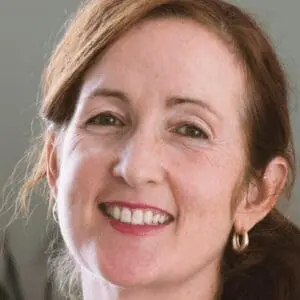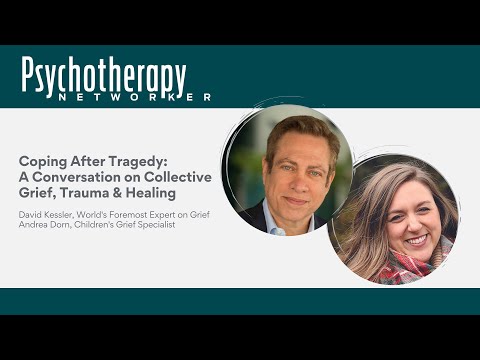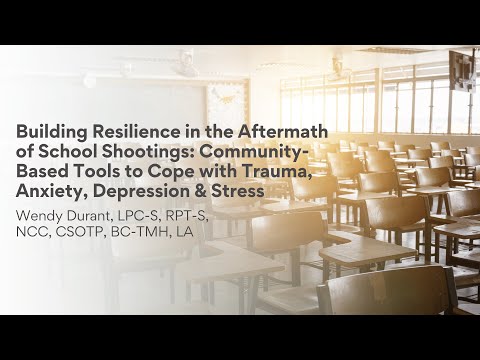As an estimated half-a-million protestors poured into downtown Washington, DC for the March for Our Lives, therapists who were in town for their field’s largest annual conference—the Psychotherapy Networker Symposium—crowded into a large meeting room just a few miles away in the city’s Omni Shoreham Hotel.
When they’d filled rows upon rows of seats, many of these mental health workers sat on the floor and stood against the wall. There was a heightened edge in the room, an animated restlessness as they introduced themselves to their neighbors, and waited for something vital to take place.
That morning, they’d raised their hands high with thousands of other attendees for a moment of silent solidarity with those gathered for the march, and now they came together for what they hoped would be a productive discussion about actions that could prevent further gun violence in their communities and schools.
Therapists are often at the center of cultural conversations around large-scale shootings, the aftermaths of which often elicit passionate cries for tightened gun control and critiques of the mental health community. Many work on the issue of gun-violence prevention, at least tangentially, in their roles as mental health practitioners seeing troubled men and boys. They’re also often involved as crisis counselors responding to the trauma that lives on for survivors of gun violence and their loved ones and communities.
Clinical psychologist Ron Taffel, who’s had a decades-long career treating youth and working with schools and had agreed to facilitate the meeting, started off by reading an excerpt from a Networker article he’d written in 1999, in the aftermath of the Columbine shootings, that examined the wish for celebrity behind many acts of violence by kids. When he finished, there was a palpable gasp in the room. Had this reality been with us for almost 20 years now?
Taffel went on to say that the shooting survivors at Saturday’s march were doing something that hadn’t been seen in the intervening decades. They were not only stealing the spotlight from the shooters, but turning it on the adults who’d failed to protect them. These crusaders were now the celebrities, doing all they could to make sure it didn’t happen again.
Before encouraging attendees to share their own suggestions, Taffel touched on concerns that he felt therapists could address with both kids and adults, including confronting ignorance about the impact of pop culture, peer groups, and technology on kids’ psyches; acknowledging the new anxiety among kids derived from social, academic, and economic pressures gone off the rails; and understanding the paradox of teens appearing self-assured but secretly yearning for adult guidance and support.
He reminded therapists that they possess inside knowledge of a community’s life, its hidden needs and vulnerabilities. And that their communities will benefit from their insights if they’re willing to take the lead in local actions around mental health issues and gun violence.
With a show of hands, those gathered identified themselves as private practitioners or staff at mental-health agencies, hospitals, schools, and faith centers. They were from the US and other countries around the world. One clinician from Columbia, notorious for rebel conflicts and the violence of drug cartels, made a point to say citizens in her country did not have access to military-style weapons, so kids shooting one another was not one of the issues they grapple with there. “It is not inborn,” she said. “You seem to know how to teach violence well here.”
One woman stood to say she was connected to one of the Parkland shooting victims personally and was heartened and grateful to find so many caring people had come together to find solutions. A therapist, her voice breaking, expressed horror that her very young child was now participating in school shooting practice drills. Her deepest hope, she said, was that they would soon end and her daughter wouldn’t grow up with the specter of gun violence hanging over her school days.
As Taffel stepped off the dais and into the crowd, concrete suggestions started to fly and Lauren Dockett, senior writer for Psychotherapy Networker, wrote them down. Many of these were actions therapists were already taking or knew about in their communities. Those who’d recently experienced violent disturbances close to home—a murder-suicide, a teenage girl threatening a mass shooting—talked about the importance of collaboration with law enforcement, local justice, churches, businesses, and schools. Some involved personal action that therapists could take as citizens and parents. They included:
- Acknowledging that the conversation should be wider than either “get guns off the street” or “address mental health and cultural failures.” Therapists can look within at their own anger and singlemindedness, then encourage or lead others in having dialogues that include “ands” and “buts” and allow for complexity of thought.
- Helping to create “communities of learners” to focus on the early warning signs of teen depression and disillusionment, and helping parents find the words to step forward when their kids are hurting.
- Joining with schools to design programs that allow for meaningful connections between the school staff, home, and every student.
- Creating online communities of local nonprofit organizations, like Together We Flourish, that offer collaborative blogs for sharing information about mental health and other issues with the larger community.
- Encouraging participation in bullying reduction programs that happen on social media as well as within their school districts, like Bully Free Starts with Me. Considering branching out and creating an additional “Gossip Free Starts with Me” program.
- Therapists involved in anti-bullying programs in schools remembering not to lose focus on also addressing the bullies and especially the bystanders.
- Keeping abreast of brain health research related to violence and compassion through the Avielle Foundation, and educating others.
- Training to be part of crisis teams that respond to large-scale violence and providing healing circles locally after tragedies and suicides.
- Therapists moderating meetings or setting up meet-ups with people who look or think differently than one another or are on either side of the gun debate.
- Reconciliation committees and restorative justice programs as alternatives to expulsions in schools; culturally based intervention and safety programs for youth; and the reallocation of resources to struggling schools.
- Joining legislative action groups for sensible gun reforms; agitating against practices like gerrymandering which can favor communities that oppose gun control; encouraging diverse candidates to run; documenting NRA support of representatives; and writing editorials.
- Creating Facebook groups like that encourage school districts to take actions like opposing guns in schools and favoring gun reforms.
- Joining Moms Demand Action for Gun Sense in America, which includes actions for educators, talking points for gun discussions, and a BeSmart program for reducing suicides and unintentional shootings from children accessing unsecured guns.
- Learning about ALICE Training (Active Shooter Response Training), and firearms safety and education programs like the National Shooting Sports Foundation’s Project Child Safe.
- Voting!
As the meeting came to an end, some participants stayed behind to share details of their ideas with one another or add them to the growing list on the flip chart. The energy was still high, and people told us they were ready to commit to action and could use all of this information in one place.
We know the list provided here is limited and there are many resources are there. We encourage anyone who’s interested to add their ideas in the comment section or to our Facebook or Twitter pages. Therapists may not have all the answers to our country’s gun violence problems just yet. But from what we saw in that room on March 24th, they can make a huge contribution.
Ron Taffel
Ron Taffel, PhD, is Chair, Institute for Contemporary Psychotherapy in NYC, the author of eight books and over 100 articles on therapy and family life.
Lauren Dockett
Lauren Dockett, MS, is the senior writer at Psychotherapy Networker. A longtime journalist, journalism lecturer, and book and magazine editor, she’s also a former caseworker taken with the complexity of mental health, who finds the ongoing evolution of the therapy field and its broadening reach an engrossing story. Prior to the Networker, she contributed to many outlets, including The Washington Post, NPR, and Salon. Her books include Facing 30, Sex Talk, and The Deepest Blue. Visit her website at laurendockett.com.












